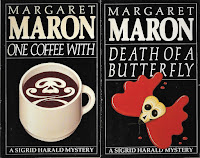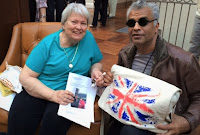Many of us have been relying
on Audible during the long nights where sleep can be elusive, with all this
Covid-19 lockdown business. When travel is prohibited [unless an emergency], and
shops remain closed [with exceptions], then health and economic damage
weigh heavily on one’s mind – dominating our thoughts. When the solitude becomes
a claustrophobic vacuum that is hard to escape – then it’s time to consider
bibliotherapy to confront the loneliness and anxiety of this age.
A dear friend of mine, an avid
bibliophile would often say to me, “you’re never alone if you have a novel,
because books are your friends,” and I would concur, recalling my own bouts
of reflective solitude.
Reading for promoting mental
health has been shown to be an effective tool, against the black dog [as Winston Churchill described
his bouts of depression]. Though there are times it becomes hard to concentrate,
to actually read. My strategy is to listen to audiobooks when I can’t read,
with a mind all fuzzy with existential angst; thoughts knitting together to create
anxiety. There’s much comfort in being read to, especially if the work is sufficiently
immersive and hypnotic. It recalls our childhood; of being a developing mind being
read stories before bed, as we struggled to understand our world and the scary
reality around us.
Recently, audiobooks have
become a crucial part of my mental rampart, to keep negative thoughts at bay, to
prevent them linking together to create weird [and disturbing] scenarios in my
head, in my thinking, because negative and frightening thoughts are not helpful
for our mental well-being.
In 2019, I was fortunate to
become obsessed by one such immersive [and hypnotic] reading experience – it was
Cari
Mora by Thomas Harris. Despite receiving a lukewarm [at best] reception, I found
it helped control my mind [in a personally difficult year] from becoming
derailed by problems that started to grow worryingly in my mind, and developing
beyond ‘the blues’ – and I don’t mean John
Lee Hooker, or Howlin’ Wolf.
Bibliotherapy is not purely distracting
your mind from the troubles in your head, though the distraction, the corralling
of one’s thoughts – is important. Bibliotherapy is more than that. It is helps
channels one thoughts, by following a narrative, which at its core is viewing
the world [aka reality] through someone else’s eyes. Reading books [or
listening to them, via Audible] can help with ‘the blues’ and assist in
preventing ‘the blues’ from getting worse, as the black dog’s bark can be heard
in the streets, echoing inside the minds of people - as they tackle this Covid-Lockdown
business, becoming fearful for the future, and that of our children’s and friends’
future.
This article from The Huffington Post
explains more –
Whether or not a book can
single-handedly tackle a person’s depression is difficult to determine, but
positive thinking has been proven to help. According to a Psychology Today
article titled “Depression Doing the Thinking,” “One of the most powerful actions
you can take in combating depression is to understand how critical the quality
of your thinking is to maintaining and even intensifying your depression—and
that the quickest way to change how you feel is to change how you think.” The
article goes on to explain how negative thoughts can enter one’s mind
subconsciously, and therefore seem more raw or true to the depression sufferer
than their own moods and feelings.
Read More HERE
So, what am I reading
currently that is sufficiently immersive that it can help quell the barking of
the black dog?
Actually, I’m ploughing my way
through [actually listening to] the dark and disturbing novels of Sarah Denzil
from Audible
I was only aware of this
writer of dark and complex thriller novels, from an interesting article from the
New York Times in 2019 –
Last year, while promoting his
debut thriller, “The Woman in the Window,” Dan Mallory praised the tradition of
literary mimicry: “It is often said that ‘good writers borrow, great writers
steal,’” he said in an interview with The Guardian, borrowing a phrase from
T.S. Eliot.
In retrospect, his choice of
words was surprisingly honest, a rare acknowledgment in a medium that prizes
originality of how deeply he was influenced by other popular thrillers.
Mr. Mallory — who was recently
the subject of an exposé in The New Yorker that detailed his past as a habitual
liar who feigned fatal illnesses and fabricated a tragic family history — has
acknowledged that the plot of his novel, which became a best seller, owes a
debt to several famous works, including Alfred Hitchcock’s “Rear Window,”
Gillian Flynn’s “Gone Girl” and Paula Hawkins’s blockbuster thriller, “The Girl
on the Train.”
“The Woman in the Window” is
also strikingly similar to a novel by Sarah A. Denzil, “Saving April.”
Read More > HERE
So, who is Sarah A Denzil and
which books of hers should I listen to and why?
I would urge you to look out
for these two interlocking novels, dramatized by Audible studios - SILENT
CHILD first and then the upcoming STOLEN GIRL [Release date: 1 March
2021]
Performed by: Joanne Froggatt
(Downton Abbey, Liar), Rosalie Craig (Company, The Queen's Gambit) and Gerran
Howell (1917, Catch-22).
The sequel to SILENT CHILD’s
dark narrative -
When Emma Price’s daughter
Gina is snatched, it is every parent’s nightmare. But Emma has lived the horror
before. As the clock ticks, and Gina is still missing, a dark game of cat and
mouse begins. Emma and Aiden must piece together the kidnapper’s puzzle, to
discover who has taken her – and why.
Emma, Aiden and Gina stand on
the brink of a new life. After the trauma of Aiden’s abduction and return, they
are slowly healing and returning to a fragile normality. Emma is desperate to
protect her children, but the world is fascinated by Aiden, the silent child
who is finally learning to speak for himself.
Against her better judgment,
Emma allows her son to attend a talk show. Her worse nightmare comes true when
her daughter, Gina, is snatched from the studio and a chilling game begins.
Emma is convinced the answers
lie in the darkest corners of the family’s past, and that Aiden must be able to
work out the puzzle, if only he dare reach into the horrors of his memory.
Silent Child written
by Sarah A. Denzil and narrated by: Joanne Froggatt
It became Audible’s 2017
Thriller of the Year
Ten years after witnessing the
tragic loss of her son, Emma Price is finally rediscovering the joy in life…
until Aiden returns. Too traumatised to speak, he raises endless questions and
answers none. Named Audible’s Thriller of the Year in 2017, this exclusive
production is the first in an unmissable series by Sarah A. Denzil, performed
by the exceptional Joanne Froggatt (Downton Abbey, Liar). As one Audible Editor
commented, ‘it will make your heart beat, your mind race and your spine
tingle’.
If you want to read about
extraordinary events in the lives of ordinary people, Denzil’s work may provide
comfort in this lockdown and the ubiquity of Covid-19.
More information on Audible
and their £7.99 / month membership CLICK
HERE
More information on the work
of Sarah Denzil CLICK HERE
All images © 2017 – 2021 Audible
apart from AJ Finn cover of The Woman in the Window © 2017 HarperCollins
Shots
Magazine wish to thank Edwina Boyd-Gibbons and Audible studios for their help
in this feature article.


































